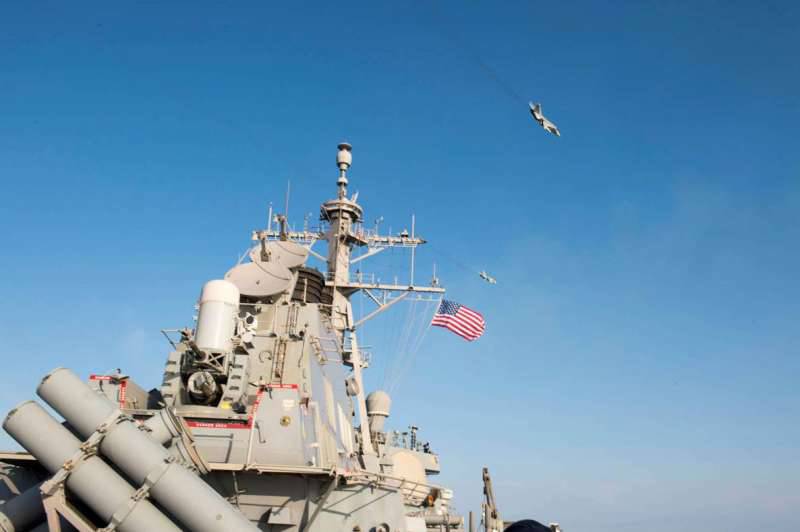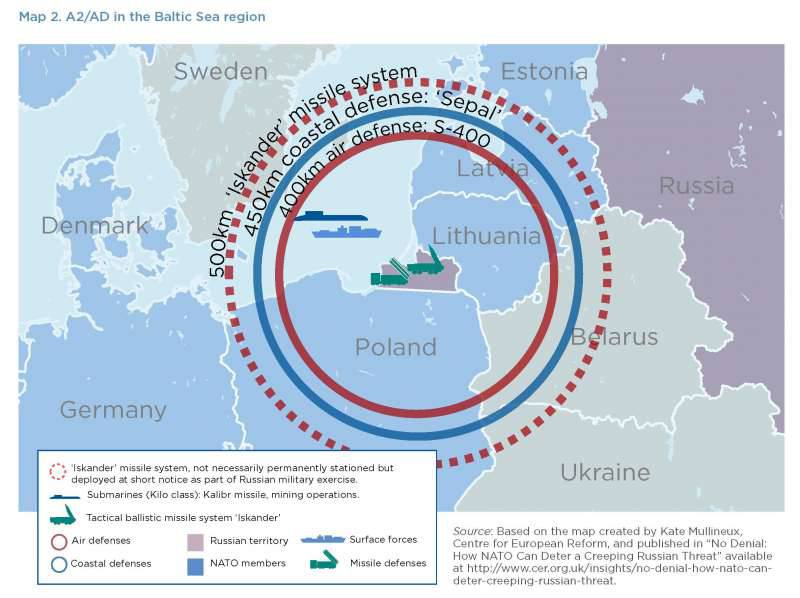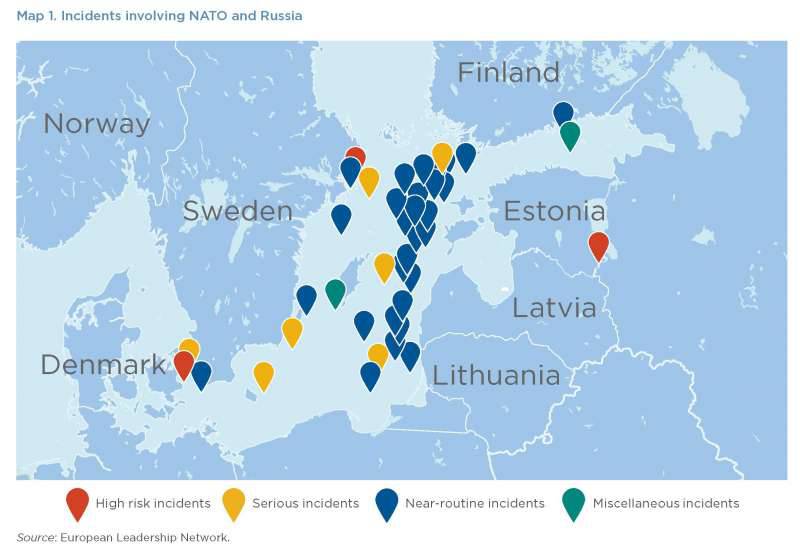USNI News: The Baltic Sea is heating up due to friction between the US, NATO and Russia
25 in April, the US edition of USNI News published an article by Magnus Nordenman entitled "Analysis: Baltic Sea Heating Up Friction Point Between US, NATO and Russia" ("Analysis: The Baltic Sea is heating due to friction between the US, NATO and Russia"). The American security expert examined the current state of affairs and made some conclusions regarding the existing differences between the main players in the region. It is noted that the article in the USNI News is based on the report "A Maritime Framework for the Baltic Sea Region", sponsored by M. Nordenmen and Franklin D. Kramer.
An American expert begins his article with a statement of facts and a reminder of recent events. In his opinion, the Baltic Sea is becoming one of the zones of friction between “aggressive Russia” and the United States, as well as the allies of the latter from North-Eastern Europe. For example, not so long ago, a pair of Russian Su-24 aircraft flew around the American destroyer USS Donald Cook (DDG-75), when it was performing training tasks in one of the Baltic Sea regions. The recent incident with aircraft and ship is only the latest example of the numerous "close contacts" between Russia and the United States on the Baltic Sea and in its airspace, observed in the last two years.
At present, the Russian armed forces are building a powerful A2 / AB system (Anti-Access / Area-Denial - “blocking access / blocking the area”) in the Kaliningrad region and in the south-eastern part of the Baltic Sea. This system is based on the latest C-400 anti-aircraft missile systems and Iskander operational-tactical missile systems. Its appearance can seriously hamper the work of US and NATO troops in the region in the event of a sharp deterioration in the strategic situation, in times of crisis or during a conflict. Russia also has coastal anti-ship missile systems "Bastion", which can be quickly deployed to the required areas. Such systems are also a serious threat to US and NATO ships.
M. Nordenmen notes that the relatively small size of the Kaliningrad region leads to some strategic advantages. First of all, it allows existing weapons to control not only the Baltic Sea, but also part of the coastal areas. The Baltic fleet of the Russian Navy, in turn, is not of large size, but its submarine forces can become a serious threat to the enemy. This places special demands on anti-submarine forces.
This situation, according to the author of USNI News, is an important issue that needs to be addressed. In the event of a serious crisis or war, the United States and other NATO countries will have to provide support to the Baltic states that are members of the North Atlantic Alliance. The organization’s military presence in these countries has been growing in recent years, but this, the analyst believes, cannot guarantee the preservation of peace. To contain the “Russian aggression”, it is necessary to ensure the possibility of a quick transfer of reinforcements, and for this it is necessary to have full access to the Baltic Sea and its ports. Thus, from the point of view of strategy, control over the Baltic Sea is of crucial importance.
However, the situation in the Baltic is not at all hopeless. NATO countries located in the region cannot boast of large naval forces, however, the existing naval groups and aviation can be combined to perform a sufficiently powerful strike. So, at the disposal of Germany there are one and a half dozen surface ships and five submarines. Poland is currently implementing a large-scale modernization program for its fleet. The Swedish Navy is small in terms of strength, but can be considered one of the best surface fleets in the world. The Baltic states, after gaining independence in the early nineties, have gained considerable experience in the fight against sea mines.
The states of the region also have a sufficiently developed air force. The armament consists of F-16, Eurofighter, F-18, JAS-39 Grippen and other aircraft. In addition, Norway, relatively distant from the Baltic, is currently beginning to operate the latest F-35 fighter jets. In total, the region's air forces have about 400 aircraft with fairly high performance. Some of these aircraft have the ability to carry out electronic warfare, without which it is impossible to counteract A2 / AD systems.
According to M. Nordenmen, in the current situation in the NATO military system there is only one component missing, thanks to which effective containment of Russia will be possible. The states of the region have all the necessary capabilities to solve this problem, but they need some new approaches to working together. Plans should be developed for the interaction of naval forces of different countries, to draw up plans for joint exercises and to create control and management systems that will be used for joint work of fleets. At the same time, special attention should be paid to issues such as reconnaissance and target detection, anti-submarine systems and the search for sea mines.
The author notes that the new plans should take into account the roles and tasks of the US Navy. The fact is that at present only the United States, and probably the United Kingdom or France, are able to be responsible for a number of key actions that may be needed in the event of an armed conflict. First of all, these are various strikes from the sea on coastal targets, as well as the landing of amphibious landings.
M. Nordenman believes that for the implementation of such plans of NATO should use the so-called. framework approach. In this case, one of the states of the organization should take the lead. It will be responsible for the development of various means and capabilities, carry out planning, exercise control and management of all fleets in the region, including the Baltic Sea and the northern regions of Europe. The North Atlantic Alliance has already used a similar approach in practice and proved its effectiveness. If necessary, NATO partner countries Sweden and Finland may be involved in the “framework” work.
However, such a system is unlikely to work effectively without the participation of the United States. The US Navy is needed for a variety of reasons. Firstly, they surpass the fleets of other Alliance countries in terms of their potential and capabilities. Secondly, the American fleet is able to direct the actions of other naval forces and intensify their actions.
The American expert believes that the Baltic Sea will remain a point of tension in relations between NATO and Russia. Over time, the risks associated with the Russian system A2 / AD will only grow and become more and more obvious. The new structure of the combined naval forces, managed by the countries of the region and supported by the American fleet, could do a lot to strengthen the defense of NATO, as well as "restrain an increasingly aggressive Russia."
***
Needless to say, in recent years, NATO’s activities in Eastern Europe, including in the Baltic Sea area, have been constantly increasing and are therefore a cause for concern. The Russian leadership has repeatedly pointed out the associated risks, and also announced the adoption of appropriate measures. In particular, in order to protect against existing risks, new anti-aircraft systems, operational-tactical and coastal missile systems, etc. are being deployed in the Kaliningrad region. In addition, the Baltic Fleet is being modernized.
Such actions of Russia quite naturally become a pretext for indignations and accusations of aggressiveness on the part of NATO countries and individual military experts. As a result, the countries participating in the Alliance need additional protection from a hypothetical Russian threat, and various experts offer their own solutions to this problem.
One of the ways to contain the "Russian threat" is given in a recent article by M. Nordenmen. It is quite expected that a foreign expert views Russia as a potential aggressor threatening the Baltic allies of the United States, which becomes a convenient excuse for proposals to strengthen the NATO grouping in the region and other similar transformations. The result of the implementation of such proposals could be a significant strengthening of the NATO grouping with corresponding consequences for the situation in the region.
However, there may be other motives behind articles like the recent Analysis: Baltic Sea Heating Up Friction Point Between US, NATO and Russia. They can lead the reader not only to the idea of the need to strengthen the armed groups in the region. In recent years, another trend has clearly emerged regarding the strategic security of the European participants in NATO.
In the current situation, the main role in ensuring the security of the participating countries of the organization is assigned to the United States, while other states prefer to save on armies, hoping for the help of their main ally. Official Washington has long hinted that this situation does not suit him and requires allies to pay more attention to their own defense.
An article in USNI News, among other things, suggests that the countries of the Baltic region are capable of ensuring their own security, even if they work together. Naturally, in this matter, they will need the help of the United States, but they will have to undertake the main work.
If such proposals are heard and accepted for implementation, the United States will be able to reduce its spending on supporting allies from Eastern Europe, since they will be able to independently solve a number of important tasks. Otherwise, the situation will not change, and the security of a number of countries will be ensured not only by themselves, but also, to a large extent, at the expense of an overseas ally.
In such a situation, a hypothetical Russian aggression can be viewed not as a real risk that threatens the security of the region, but as a convenient excuse to put pressure on the allies. In other words, the US is hinting at its European colleagues that their security is at risk and they should take care and take action on their own, even with some outside support.
As we see, in one way or another foreign countries are trying to solve existing problems of a different nature. One of the methods of this are various publications about various problems that threaten the security of third countries. It seems that the approach used does not yet provide the expected results, since the United States still has to take on the solution of various strategic tasks. Will the situation in the future - time will tell.
The article "Analysis: Baltic Sea Heating Up Friction Point Between US, NATO and Russia":
https://news.usni.org/2016/04/25/analysis-baltic-sea-heating-up-as-friction-point-between-u-s-nato-and-russia
Full text of the report “A Maritime Framework for the Baltic Sea Region”:
http://atlanticcouncil.org/images/publications/Maritime_Framework_Baltic_Sea_0408_web_Updated.pdf



Information